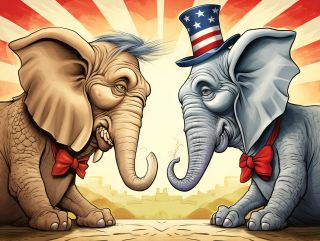Leadership
How to Protect Yourself From Demagogues and Disinformation
Personal Perspective: As the candidates begin to debate, what's at stake?
Posted August 24, 2023 Reviewed by Gary Drevitch

At the pitched extremes of the American political spectrum, each side thinks the other is off the rails and taking the country toward doom. In this environment of intense perceived threats, demagogues and megalomaniacs can operate in the political, religious, business, and interpersonal spheres. In the public domain, they can capture and enhance an ecosystem of fears, resentments, and perceived threats to amplify themselves and, they propose, their group. They anoint themselves as heroes and saviors, and scapegoat, vilify, pillory, dehumanize, tar-and-feather, and demonize their opposition. They "win" by making us forget our shared humanity.
For many of us in the internet age, there is little or no filter to ensure that the information and leadership we are getting is accurate, comprehensive, and free of bias. Many of us are left to our own devices to decide whom to follow and what to believe in. We must be on guard against malicious actors whose intent is to deceive and enrage us into becoming tools for their wiles. We are all vulnerable or can be made vulnerable, and the consequences can be disastrous on personal and societal levels.
Here are some questions we should all ask as we evaluate those who are asking for our attention, loyalty, labor, or vote:
- What feelings is this leader/source trying to enhance in you about those who are not in your demographic, political, or socioeconomic group?
- What feelings does this leader/source enhance in you about those the leader/source disagrees with?
- How does this leader/source make you feel about ethnic, racial, and sexual minorities? What about immigrants and migrants? (These are vulnerable groups in our society, by any measure.)
- Does the leader/source create a binary “us vs. them” split, or are they committed to seeing shared humanity despite differences of opinion or identity?
- Does the leader/source rely on rhetoric, opinion, spin, or even propaganda rather than on verifiable facts?
- How do they deal with responsible questions about their motives?
- Are they primarily out to benefit themselves?
- If you think they are trying to primarily benefit themselves or a particular demographic or socioeconomic group or faction, what risk do they pose to those outside their group or faction?
- If you see another group or faction’s leader or source posing a threat to your group or those you care about, are your favored leaders dealing with that threat in ways that enhance or diminish chances of violence and harm?
- How do you view people who don’t like your leader or source?
- Are you and your leaders on the healthy or unhealthy sides of the influence spectrum?
- Is this leader an egalitarian or do they promote the social dominance of one faction?
- Finally, and perhaps most importantly: Does this leader, source, or group support democratic norms and the egalitarian aspirations of a functional democracy?
Outrage motivates. Outrage is clickbait, it sells papers, and it turns out voters. Full disclosure: I’m often quite outraged at the words and actions of some conservatives. But I’m using the above questions to put limits on how I respond to my own sense of threats against the vulnerable and marginalized in our society. Those who threaten are still human, and entitled to their opinions—but not control over vulnerable lives.
But what does it say about a society that advances people who seek to subordinate, dominate, and control others? Who mislead their followers and threaten perceived enemies for their own profit? To paraphrase a teenage girl profiled in the Netflix documentary Daughters of Destiny, attending the novel Shanti Bhavan residential school in India, What kind of humans don’t fight for equality?
I’m not sure—but I’m hoping we don’t further empower inequality, propaganda, and division. There’s not much of a filter on what comes in these days, but we can collectively put a filter on what comes out of our confusing and enraging tangle with our times.
Demagogues, disinformation, and megalomaniacs seem to have a bead on us, but we can make sure they don’t divert us from the causes of conscience and mutually-assured survival and well-being.
I wonder how we’ll be remembered in 20 or 100 years. How will we remember ourselves?
(c) 2023 Ravi Chandra, M.D., D.F.A.P.A.
References
Sidanius J, Pratto F. Social Dominance: An Intergroup Theory of Social Hierarchy and Oppression. Cambridge University Press, 2001
Chandra R. Which of Six Power Types Will You Embody and Support? Psychology Today Pacific Heart blog, September 15, 2022


